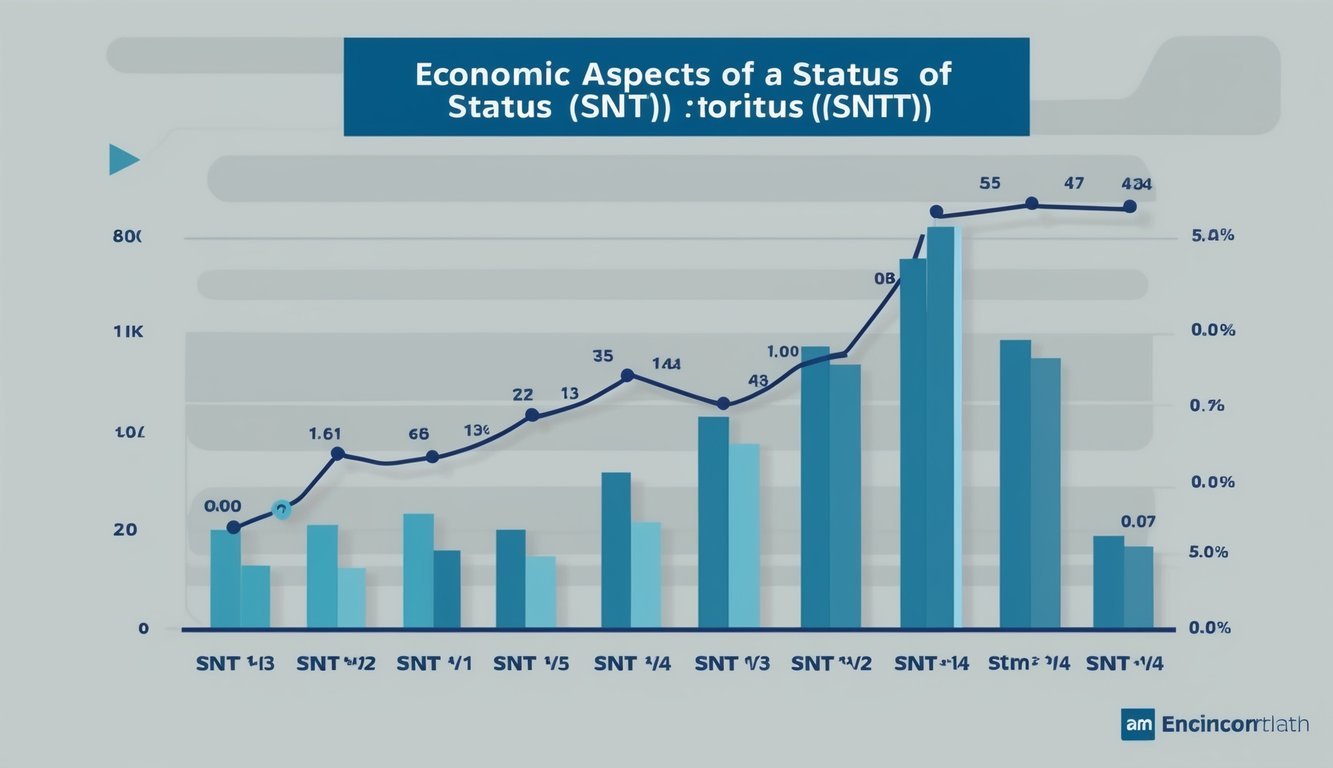Have you heard about Status (SNT)? It’s a cool new way to use your phone for crypto stuff.
Status (SNT) is a mobile app that lets you chat, use crypto apps, and store digital money all in one place.
It’s built on Ethereum, which is a big deal in the crypto world.
Think of Status as your all-in-one crypto buddy. You can send messages to friends that no one else can read. You can also use lots of different crypto apps right from your phone. And if you want to keep your digital coins safe, Status has a wallet for that too.
The SNT token is what makes Status tick. You need it to use some of the app’s special features. It’s like a VIP pass for the Status world. Plus, if you have SNT, you get to have a say in how Status grows and changes over time.
Key Takeaways
- Status combines messaging, crypto apps, and a wallet in one mobile app
- SNT tokens are needed for special features and give users a voice in the project
- The app aims to make using crypto and blockchain tech easier for everyone
Unpacking Status (SNT)
Status is a mobile app that lets you chat, browse, and use crypto. It runs on Ethereum and has its own token called SNT.
Concept and Vision
Status wants to make crypto easier to use. You can think of it as WhatsApp meets crypto wallet. The app lets you send messages and money to friends. But it’s not just for chatting – you can also use it to explore decentralized apps (dApps) on Ethereum.
The big idea is to give you more control over your data and money. With Status, you don’t need to trust a big company with your info. Everything is encrypted and runs on the blockchain.
SNT is the fuel that makes Status work. You need it to use some cool features in the app. It also gives you a say in how Status grows.
Core Features
Status packs a lot into one app. Here are the main things you can do:
- Chat: Send encrypted messages to friends
- Wallet: Store and send digital assets
- Browse: Use Ethereum dApps right from your phone
- Earn: Get paid in crypto for tasks in the app
The chat is private and secure. No one can read your messages except you and who you’re talking to.
The wallet lets you hold different types of crypto. You can send money to friends as easily as texting them.
With the built-in browser, you can use tons of Ethereum apps without leaving Status. It’s like an app store for crypto.
SNT unlocks extra perks. You can use it to vote on new features or even run a node to help keep the network running.
Economic Aspects of SNT

Status Network Token (SNT) has some interesting economic features. Let’s look at how it moves in the market and the numbers behind its supply and trading.
Market Dynamics
SNT’s market cap is about $101.4 million. This puts it in the mid-range of crypto tokens. The price of SNT can change a lot in a short time.
You might see it go up or down by several percent in a day. This is normal for many smaller cryptos. SNT’s value is tied to how people use the Status network.
If more folks start using Status apps, SNT might become more valuable. But remember, crypto prices can be very unpredictable.
Trading Volume and Circulating Supply
SNT has a daily trading volume around $8 million. This means a good amount of SNT is bought and sold each day. The more trading, the easier it is to buy or sell SNT when you want to.
There are about 4 billion SNT in circulation. This is out of a total supply of 6.8 billion tokens. Not all SNT are available to trade right away.
Some tokens are held back for future use. This can affect the price over time. As more tokens enter the market, it could change how much each SNT is worth.
How to Acquire Status (SNT)

Getting your hands on SNT tokens is pretty straightforward. You can buy them on exchanges and keep them safe in a wallet. Let’s break it down for you.
Using Cryptocurrency Exchanges
Want to buy Status (SNT)? You’ve got options. Popular exchanges like Binance make it easy. Here’s what you need to do:
- Create an account on a crypto exchange that lists SNT.
- Verify your identity if required.
- Add funds to your account.
- Find the SNT trading pair you want (like SNT/USD).
- Place your order.
On Binance, you can use Google Pay or Apple Pay to buy SNT directly. Just pick your payment method and follow the prompts. It’s that simple!
Storing SNT Safely
Once you’ve got your SNT tokens, keeping them safe is crucial. Here are some tips:
- Use a hardware wallet for top-notch security.
- Consider software wallets for easier access.
- Never share your private keys or recovery phrases.
Remember, if you’re not trading, it’s best to move your SNT off the exchange. This protects you from hacks or exchange issues. Always double-check addresses when sending SNT to avoid losing your tokens.
Status (SNT) in Retrospect

Status (SNT) had a notable start with its Initial Coin Offering. Since then, it has seen ups and downs in its return on investment for early supporters.
Initial Coin Offering (ICO)
Status made waves with its ICO in June 2017. You might remember the buzz it created in the crypto world. The team raised about $100 million in just a few hours. Pretty impressive, right?
Here’s a quick look at the ICO details:
- Date: June 2017
- Tokens sold: 41% of total supply
- Price per token: $0.037
The ICO was so popular that it caused congestion on the Ethereum network. Many investors couldn’t get in due to the high demand. This showed just how much interest there was in Status at the time.
Return on Investment (ROI)
If you were lucky enough to get in on the ICO, you’ve seen quite a ride with SNT’s price. Like many crypto projects, Status has had its ups and downs.
Here’s a rough timeline of SNT’s price movement:
- ICO price: $0.037
- All-time high: $0.67 (January 2018)
- Current price: Varies, but generally lower than ATH
The ROI for early investors was huge during the 2017-2018 bull run. But since then, SNT’s price has cooled off. If you’ve held onto your tokens, you’ve likely seen both big gains and losses.
It’s worth noting that ROI isn’t just about price. The Status Network’s development and adoption also play a role in the project’s overall success.
Frequently Asked Questions

Status (SNT) sparks curiosity among crypto enthusiasts. People wonder about its price, availability, and real-world uses. Let’s tackle some common questions about this intriguing token. One frequently asked question is, “what is swipe cryptocurrency? ” This inquiry reflects a broader interest in understanding how different digital currencies and tokens can be utilized in various applications, from decentralized messaging to facilitating transactions on the blockchain. As more people engage with the crypto space, exploring the functionalities of different tokens like Status becomes crucial for maximizing their benefits.
How’s the SNT coin price looking these days?
SNT’s price changes often. As of November 2024, it’s trading around $0.0244. The market can be unpredictable, so keep an eye on trusted crypto price trackers.
Can you snag SNT on Binance, or what?
You can buy SNT on several exchanges. While Binance isn’t mentioned in the search results, 154 active markets trade SNT. Check popular crypto exchanges to find where you can get your hands on some tokens.
What’s this buzz about Status app?
The Status app is pretty cool. It’s an open-source messaging platform and mobile browser. You can chat with friends and use decentralized apps on Ethereum, all in one place.
What future predictions are floating out there for SNT coin?
Crypto predictions are tricky. Some folks think SNT might grow with the adoption of decentralized tech. But remember, the crypto world is super volatile. It’s smart to do your own research before making any moves.
What’s the SNT token all about anyway?
SNT is the fuel for the Status network. It’s an Ethereum-based token that lets you access special features in the Status app. You can even use it to have a say in how the network develops.
Do folks use SNT for anything in healthcare?
The search results don’t mention any specific use of SNT in healthcare. Most of its applications seem to be in messaging and accessing decentralized apps. If there are healthcare uses, they’re not widely discussed in these sources.





